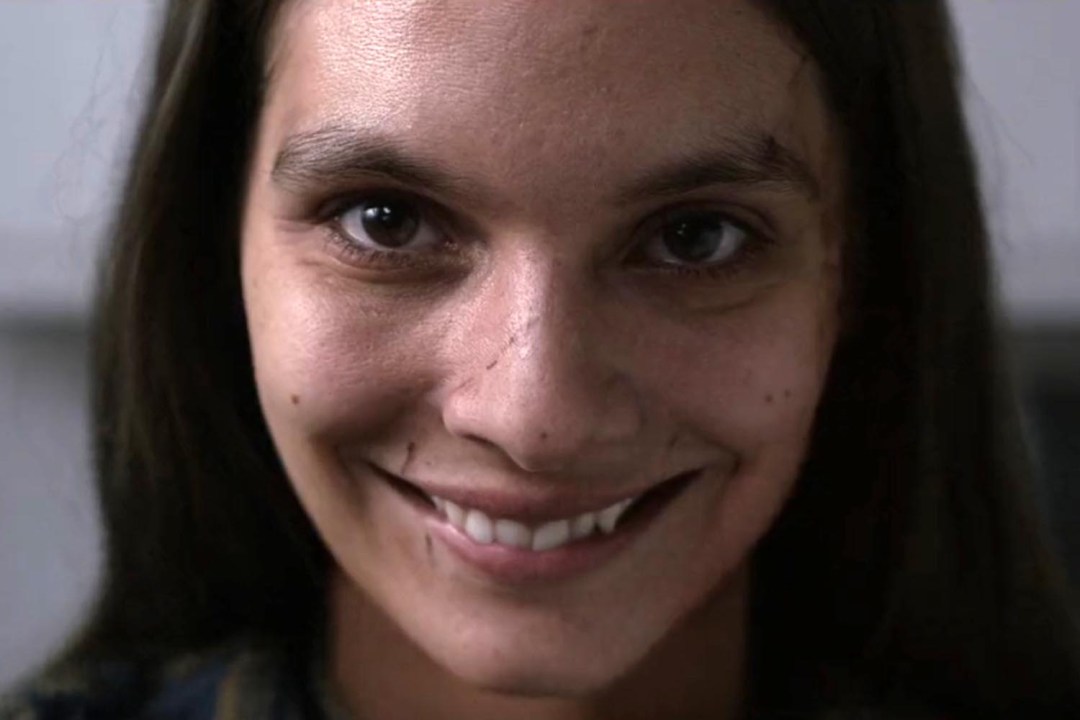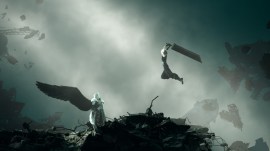The best movies on Sky Cinema and Now TV
Sky's streaming service is packed with wonderful movies - here are the ones you should watch first

If you’re seeking a TV service focused primarily on movies, it may not be Prime Video, Netflix or Disney+ that deserves your attention. Instead, consider a subscription to Sky Cinema – available via Now (previously Now TV), Sky Stream and regular satellite-derived Sky. Here’s our guide to the best movies on Sky Cinema and Now.
Now tends to be better served with newer, bigger-name films than any of its main rivals, with at least one new movie being added every day to an already bulging collection. The sheer size of that library means it’s not always easy to immediately find something to watch though (you know: the paralysis of choice and so on). Which is where we come in. The Stuff team has picked out a selection of must-see cinematic masterpieces both old and new, so the next time you’re settling down for an evening on the sofa, you can conserve your brainpower for picking the right snacks rather than the right movie.
Smile
One of the surprise horror hits of the past few years, Smile is a relentless psychological thriller that, despite having a slightly silly central ‘gimmick’ (the film’s evil presence manifests itself as a creepy smile on the face of an otherwise normal person), quickly establishes an atmosphere full of dread, paranoia and discomfort that doesn’t let up until the end. It’s might not be the smartest or most stylish film of its genre, but anyone who wants a popcorn horror with extra bite will end up sporting an odd grin of their own by the time the credits roll.
Train to Busan
A South Korean zombie flick set almost entirely on a high-speed train? Where do we sign up? Train to Busan might not shatter the zombie movie mould, but it’s an entertainingly fraught tale of a father and daughter (plus a ragtag group of other survivors) trapped in a confined space with a bunch of fast-moving, vicious and utterly relentless infected. If you’re tired of Western horror movies and fancy something a little different, it’s well worth two hours of your time.
Oldboy (2003)
To describe Oldboy as intense would be like saying Piers Morgan is unpalatable – i.e. an enormous understatement. To watch it is to be visually assaulted for 120 mins, your emotions squeezed and stamped on and flung around the room until you’re left thinking that maybe you ought to go for a bit of a lie down.
A South Korean thriller about a man who’s locked in a room for 15 years with no idea why – before being released to seek vengeance on his captors – it’s never exactly fun viewing, but it is absolutely riveting. Story-wise it’s sharp and packed with action, the acting is outstanding and at the end you’ll be left battered and bruised but still wanting more. Brilliant.
Nope
Jordan Peele’s grand Spielberg-esque thriller concerns a pair of horse-wrangling siblings (Daniel Kaluuya and Keke Palmer) whose California ranch is menaced by something strange in the sky. Meanwhile, their theme park-owning neighbour seems to be running some kind of dodgy money-making scheme that doesn’t involve the standard rides and attractions.
Ever the crafty, self-aware director, Peele plays with classic tropes and preconceptions to mould a clever blockbuster that manages to effectively turn the camera around and point it back towards the viewer. Despite (or perhaps because of) that, Nope has proved a divisive film with audiences and critics alike, but few would dispute that its cinematography, sound design and visual effects are anything less than superb.
John Wick
Keanu Reeves is in full Keanu Reeves mode (if you know, you know) as besuited gunman John Wick. Wick was once a very bad man: a preternaturally efficient assassin working for the very the nastiest gangsters in the underworld. Nicknamed the Baba Yaga and dubbed ‘the guy you send to kill the boogeyman’, he made his living through death. Until he found love and retired his shooting fingers for good.
Inevitably, Wick’s attempts at a normal life go horribly awry, culminating in a gang of criminals murdering the cute puppy left to him by his late wife. Cue vengeful retaliation in the form of some of the finest gunplay committed to screen since, well, Keanu wowed us way back in The Matrix. They don’t make many action movies like this anymore (except they do, kind of, in the form of the several John Wick sequels – none of which are as ace as the original).
Ex Machina
The subject matter of Alex Garland’s 2014 movie feels more relevant than ever. Tech worker Caleb (Domhnall Gleeson) wins a stay at his CEO’s high-security bunker home in an office contest. This ‘prize’ turns out to be a convenient excuse for said CEO (Oscar Isaac) to ask Caleb to assess the company’s latest invention Eva (Alicia Vikander), a humanoid robot running on highly advanced AI software. Can she pass the Turing Test even if her examiner knows full well she’s a robot?
The interactions between Eva and Caleb are infused with flirtatious humanity. Despite being aware of her artificial nature, Caleb finds plenty to admire in his artificial companion (some incredible make-up and special effects make her equally appealing to the audience). That’s what makes the denouement of this brilliant sci-fi movie all the more jaw-dropping.
Battle Royale
In this cult classic’s dystopian Japan, teenage delinquency has driven the government to concoct a drastic solution: once a year, a randomly selected high school class is dropped off on a deserted island, handed an arsenal of weaponry and forced to fight until only one child is left alive. Whatever happened to ‘hug a hoodie’?
If being forcibly inducted into an orgy of violence sounds like a pretty harsh punishment for chatting during double maths, it’s best not to overthink things: just enjoy the carnage as petty grudges turn bloody, bullies get their comeuppance and best pals become deadly enemies. Having provided inspiration for everything from The Hunger Games to Fortnite, Battle Royale is simply a must-watch piece of exploitation cinema.
The Black Phone
Based on the novel by Joe Hill, Scott Derrickson’s horror movie hits all the right notes. A serial killer thriller, ghost story and family drama rolled into one, it’s rich in Stephen King-esque tropes: small town, period setting, rowdy school, troubles at home and a villain (played by Ethan Hawke) who feels both supernaturally evil and terrifyingly real. It’s not often modern horror films feel as well-crafted and non-gimmicky as this, so our suggestion is to settle in on a quiet night and let it get its hooks right into you.
Top Gun: Maverick
Is Top Gun: Maverick the movie that saved movie theatres? Steven Spielberg certainly thinks so, crediting Tom Cruise’s return to his most iconic 1980s role as a kind of panacea in Panavision: a summertime blockbuster so universally appealing and crowd-pleasing that it convinced a public cowed by COVID-19 and a cornucopia of effort-free at-home streaming services into returning to picture houses in droves.
Maverick – in which Cruise’s ageing flyboy is forced back to his roots to train the next generation of fighter aces – is certainly an exhilarating and warmly nostalgic ride, offering plenty of call-backs for the old-timers along with some of the greatest airborne action sequences ever put on celluloid. Everyone should see this story of daredevil pilots, romance, redemption and learning to grow old gracefully. Even if a cinema screen is where it really belongs.
Elvis
Who better to oversee a biopic of the King of Rock and Roll than Baz Luhrmann, a director well-versed in the type of camp, OTT entertainment associated with Elvis Presley’s Las Vegas years? Luhrmann doesn’t disappoint here: Elvis is a glitzy, glamourous and non-stop ride through the icon’s short life, complete with soaring musical sequences and hard-to-forget performances (a fat-suited Tom Hanks as Presley’s Machiavellian manager Colonel Tom Parker being particular difficult to shift from one’s brain).
Holding the entire thing together can’t have been easy, but Austin Butler’s Oscar-nominated lead performance succeeds. Poor Butler appears to have undergone some kind of permanent psychic transformation as a result of this role (his normal speaking voice seems to be forever Elvis-ified), but it’s a certified star-making turn.
Jaws
The film that discouraged an entire generation from skinny dipping, Jaws remains one of the most influential, most copied and most beloved films of all time.
The premise is beautifully simple: when a New Jersey seaside resort is terrorised by a killer Great White shark, the local police chief decides to hunt it down. But it’s the film’s presentation, script, direction and its iconic score that make it so special. Director Steven Spielberg cranks up the tension through his use of perspective and sound, leaving the audience constantly on edge, but Jaws isn’t afraid to contrast its scarier moments (and make no mistake: this is essentially a horror movie) with fantastic beats of levity and comedy.
The end result is that it’s still an incredibly rewarding and riveting watch more than 40 years after its release. Just do yourself a favour and avoid the sequels.
Bodies Bodies Bodies
A group of wealthy 20-something friends gathers at a palatial home and decides to ride out an approaching thunderstorm by taking lots of drugs, drinking gallons of booze and playing a murder in the dark-style game. When the shenanigans get a little too real, it sparks off a rapidly escalating flurry of mistrust and paranoia where old grudges are refreshed and new suspicions are forged.
Working both as an efficient murder mystery horror flick and a venomous social satire on Gen Z’s tendency for vacuity, victimhood and backstabbing selfishness, Bodies Bodies Bodies is one of the rare films that succeeds in being likeable despite lacking a single likeable character.
The Northman
Arthouse director Robert Eggers’ brutal, bloody retelling of Hamlet – in which Viking warrior Amleth takes revenge for his father’s death – cost a similar amount of money to a big summer blockbuster but has the slightly off-kilter sensibilities of an indie movie. It certainly makes no attempt to coddle its viewers with easy-to-like characters, a fast-moving plot or frequent action scenes, and while it never feels like a chore it’s not always an easy watch. It’s a glorious-looking piece of cinema, though, and few viewers will be left in any doubt as to Eggers’ commitment to making an interesting film rather than a crowd-pleasing money-maker.
Pulp Fiction
Reservoir Dogs put Quentin Tarantino on the map as a writer/director, but it was follow-up Pulp Fiction that cemented him as the enfant terrible of 1990s cinema, as well as inspiring an entire generation of imitators (none of which came close, we might add).
On the face of it, this film is a trio of interweaving stories set in the Los Angeles criminal underworld – a novel structure in and of itself. But it’s the style, snappy dialogue, music, depictions of violence and drugs, and (yes) dance sequences that truly make it something special. If we had to pick a movie that best sums up cinema in the 1990s, it’s tough to think of a better bet.
It’s arguable that Tarantino has yet to top Pulp Fiction. He certainly hasn’t made anything since that feels as fresh, freewheeling and thrilling.
The Hunt for Red October
Highly decorated Soviet submarine captain Sean Connery goes off-mission in an undetectable nuclear sub, causing the CIA’s Alec Baldwin to give chase… in person. Wanting their top secret hardware back, the Russians are (figuratively) on board with the hunt, but things hot up below deck when Baldwin (literally) joins the Red October’s crew and forms an unlikely alliance. A masterful piece of Tom Clancy-penned Cold War sub-aquatic suspense directed by Die Hard’s John McTiernan.
The Batman
Another Batman reboot, this time with a pallid, soft-spoken and very emo Robert Pattinson playing the caped crusader in a sodium-glow Gotham where it seems to be permanently night-time, raining or both. When a series of city bigwigs turn up dead with riddles and ciphers duct-taped to their bodies, Jim Gordon brings in Batman to help investigate – all while Selina Kyle (aka Catwoman) attempts to track down her missing friend. Somehow, you sense, all this stuff is linked.
Even if we’ve seen it all before (and we have, in all honesty), this movie is at least visually impressive, despite it feeling even more grounded in reality than the dour Nolan trilogy.
Terminator 2: Judgment Day
James Cameron is renowned for pushing special effects technology with an almost religious fervour (we have him to ‘thank’ for the brief 3D movie ‘craze’) and in Terminator 2 he conjured up the most advanced computer-generated character yet seen on the big screen. The liquid-metal T-1000, a cyborg assassin sent back in time to murder tearaway teenager John Connor, used every CGI trick in the book to sell the reality of the character. And it doesn’t look half bad over 30 years later.
Audiences in 1991 were floored by this digital creation as it morphed from one character to another, oozed through the bars of a steel door and turned its hands into blades, but ultimately this movie succeeds for other reasons, namely Arnold Schwarzenegger’s iconic performance as the ‘good guy’ T-800 sent to protect Connor, the equally impressive practical SFX and fast-moving, riveting plot.
Looper
Rian Johnson’s Looper is a brilliantly mind-bending time travel action-thriller with Joseph Gordon-Levitt playing an assassin whose job consists of putting a bullet in the head of people teleported to his time by a future mob organisation (we know, we know – but stick with it). When the poor sap that appears before him turns out to be his future self (played by Bruce Willis) things get understandably complicated.
The intricate plot is strongly complimented by plenty of action and strong performances from all, although Gordon-Levitt’s Bruce Willis-like prosthetic nose is initially a little distracting.
Hot Fuzz
The second entry in the Simon Pegg/Nick Frost/Edgar Wright ‘Cornetto Trilogy’ that also includes Shaun of the Dead and The World’s End, Hot Fuzz takes the 90s action movie template and lands it in sleepy rural England. As Shaun riffed on old zombie movies, this turns action flick tropes and traits into a source of comedy – and it does so in such a warm, technically adept way that the filmmakers’ respect for their inspirational source material shines through.
Not only is Hot Fuzz – in which Pegg’s hero supercop is shipped off to a sleepy West Country village for making the rest of the Metropolitan Police look bad – hilarious, it’s also a fantastic homage to the likes of Point Break, Lethal Weapon and Bad Boys.
Gladiator
Russell Crowe rose to superstardom off the back of this Roman Empire epic, in which he plays a celebrated and honourable general who, when betrayed by Joaquin Phoenix’s power-mad new emperor, is forced to fight his way to vengeance via the blood-stained pits of gladiatorial combat.
Directed with typical visual panache by Ridley Scott, Gladiator is a stirring, old-fashioned Hollywood blockbuster of the highest order, replete with all the classic tropes: sweeping vistas, rousing emotion, romance, scintillating fight scenes and a truly hateful villain in Phoenix. Movies of this type don’t generally age well – astonishingly, this is now over 20 years old – but thanks to Scott’s mastery behind the camera and Crowe’s Oscar-winning performance in front of it, Gladiator feels as fresh as the day it hit cinemas.
Spider-Man: No Way Home
Tom Holland’s third outing as the wallcrawler sees him unwittingly pulled headlong into the multiverse, reuniting him with a bunch of villains from previous, pre-Holland movies such as Doctor Octopus, the Green Goblin and Electro. Having inadvertently sucked all these costumed goons into his own world, Spider-Man needs to defeat them and send them back from whence they came – and luckily for him, he won’t have to do it alone.
With the rate at which Marvel Cinematic Universe films arrive, and the way in which the studio tends to polish out anything resembling nuance or character, it’s easy to dismiss them as entertaining but forgetful fluff. And that’s basically what No Way Home is, but the way it tugs at your nostalgia-nodes makes it worth a watch in our book, particularly if you’ve been a fan of Spider-Man movies since Sam Raimi’s brilliant 2002 film.
Jackass Forever
Over 20 years on from the TV show’s debut, the Jackass crew (or most of them) reunite for a new feature-length barrage of bone-shaking stunts and wince-inducing pranks. The formula may not have changed (and yes, if you’re wondering – it’s still not big, it’s not clever but it’s very, very funny) but the faces are crinklier, the hairlines are higher and the teeth are fewer. There’s something strangely heart-warming in watching these middle-aged men getting back together to act the fool, as well as symbolically pass the torch on to a new, younger generation of masochistic loons.
Popstar: Never Stop Never Stopping
Andy Samberg and his Lonely Island cohorts Jorma Taccone and Akiva Schaffer bring their brand of humour – previously confined to YouTube, the occasional Saturday Night Live sketch and their records – to the big screen in this unjustly overlooked mockumentary about egomaniacal pop star Conner4Real.
With old friends sidelined or cut out of his life altogether, Conner’s life and career spiral into disaster as his second album flops – which of course, makes for an entertaining ride. The cameos from dozens of real-life celebrities like Snoop Dogg, Seal and Paul McCartney add plenty of spice to the mix.
Scream (1996)
In self-referential teen horror Scream, Nightmare on Elm Street director Wes Craven riffs on the genre tropes he himself helped define: here, the masked killer sticks slavishly to the stalk-and-slash rules set by older scary movies.
What could easily have turned out as a schlocky parody actually works as both a creepy, tension-wracked slasher flick and an amusing po-mo meta-comment on the genre, helped in part by a strong cast (the most famous member of which is bumped off in the first ten minutes), some great twists and plenty of quotable lines. It was followed by a raft of lesser sequels, a TV series and a full-on nostalgia-fuelled reboot, but for our money the original remains by far the best.
Last Night in Soho
Edgar Wright’s thriller sees a lonely, Swinging Sixties-obsessed fashion student from the sticks move to London’s Soho – a place she has idealised and dreamed about for years. And dream she does, discovering a strange ability to travel back to the area’s 1960s heyday in her sleep and experience the bright lights and glitz for herself, albeit as a witness rather than a participant. But she finds out that there’s a dark side to the glamour – one that threatens to bleed into her life in the present day. Matt Smith and Anya Taylor-Joy also star.
Pig
Nicolas Cage’s rehabilitation as an actor continues in Michael Sarnoski’s superb and affecting drama. Cage is excellent as a bedraggled, near-silent truffle hunter living in the Oregon forest, alone except for his beloved foraging pig. When the hog is kidnapped, he springs into action to track her down – but anyone expecting a John Wick-style revenge thriller might be surprised at where Sarnoski’s film goes. Instead of leaving a trail of bodies and broken glass, Cage is forced to revisit his past and confront his choices as he reckons with the task at hand.
Eternal Sunshine of the Spotless Mind
Sometimes sci-fi is all about spaceships and explosions and men in silly costumes waving giant glow-sticks at each other; sometimes it’s about a vision of the near future, or even a parallel present, that’s close enough to our reality to properly sting.
Eternal Sunshine is mostly a modern love story, the inspired twist being that in this world you can pay to have all memories of a specific person erased from your mind. It’s complicated and clever but ultimately warm and honest; most impressively of all, it’s got Jim Carrey and Kate Winslet in it and you don’t want to shoot either of them.
The Matrix
The Matrix isn’t just an entertaining action movie. This film is packed with cultural touchstones and iconic moments, and it still looks amazing more than twenty years after it first emerged from the Wachowski’s febrile minds.
Keanu Reeves has never been better as Thomas Anderson, an office-bound drudge by day and hacker by night who finds himself drawn into a reality-shattering adventure full of flying bullets, mind-blowing martial arts sequences and some early CGI that doesn’t look like absolute rubbish today. Whoa!
Riders of Justice
Watching the trailer above, you might think this Danish film is just another revenge flick, with Mads Mikkelsen’s soldier picking up an arsenal of weaponry and going H.A.M. in true Neeson/Statham/Reeves style on the gang of evil goons that killed his wife. But there’s so much more to Thomas Anders Jensen’s movie than that: it’s surprisingly funny, often sweetly heart-warming and occasionally brutal, not to mention a deconstruction of the entire concepts of revenge, loss, grief and (as the title hints) justice. An arthouse movie wrapped in the garments of an action-thriller, then, and well worth a watch for anyone bored of either genre.
The Raid
Directed by Welshman Gareth Evans, this 2011 Indonesian action film has already reached certified cult classic status and spawned a decent sequel.
A showcase for the Indonesian martial art of pencak silat, it features electric fight scene after electric fight scene as one plucky cop takes on an entire apartment block full of ruthless criminals in an attempt to reach the vicious drug lord on the top floor. It’s a beautifully simple premise, but the heart-pumping action sequences are bolstered by a pretty great and emotional story, too. Quite simply a must-watch for martial arts fans (although they’ve probably seen it 50 times by now) and highly recommended for anyone else.
Jurassic Park
Almost three decades after its release, Jurassic Park remains a near-perfect film. Steven Spielberg’s mastery of pacing, camera, editing and sound is on full display here, as the living attractions in a dinosaur theme park take advantage of chaos theory to turn on their captors. The dreary, uninspired sequels have shown that there’s much more to making a great movie than a great idea (what if dinosaurs and humans could interact?) and great special effects; this is a rare occasion when a mega-budgeted box office-breaking blockbuster feels full of heart.
No Country for Old Men
No Country for Old Men always felt like the most screen-adaptable of Cormac McCarthy’s novels, and with the Coen brothers at the helm it would have taken some kind of disaster to stop this movie from becoming an instant classic. And it is, thanks to not only the source material and its sympathetic treatment by America’s finest filmmaking pair of siblings, but due to killer performances from Josh Brolin, Kelly Macdonald, Woody Harrelson, Tommy Lee Jones and, most memorably, Javier Bardem as a philosophising, seemingly unstoppable mass murderer with a criminal haircut. If you like your thrillers as contemplative and lyrical as they are nail-biting, look no further.
Raiders of the Lost Ark
The first (and we think best) Indiana Jones film is a globe-trotting blockbuster that has set the standard for all Hollywood adventure movies since. A throwback to the flicks of Spielberg and producer George Lucas’ childhood, it sees Ford’s bullwhip-brandishing archaeologist travel to Egypt in an attempt to locate the Ark of the Covenant ahead of the Third Reich, who plan to use the ancient artefact’s powers to place the world under Nazi rule.
The visual effects and, er, ‘cultural depictions’ have aged noticeable since 1981, but this is mainstream filmmaking at its purest – a broadly entertaining, fast-paced and iconic movie that it’s almost impossible not to get swept up in.
The Lord of the Rings trilogy
Peter Jackson’s epic adaptation of the even more epic fantasy novel is not without its issues (I mean, how many endings does a film need?), but the director’s achievement in wrangling such an uneven, weighty and wide-ranging tome into three enjoyable blockbuster movies should not be overlooked.
You likely know the story already: a young hobbit must travel from his peaceful, bucolic corner of the world to the hellish realm of Mordor to destroy a powerful ring. Along the way he’ll encounter dangers, make new friends, take part in an apocalyptic war and much, much more. This trilogy is action-packed, well-acted and visually arresting – and capable of generating plenty of emotion at times, too.
Django Unchained
Quentin Tarantino’s western (or, more accurately “southern”) takes its cues both from Sergio Leone and the blaxploitation genre. Set mostly in the Deep South, Django Unchained pits Jamie Foxx’s titular freed slave against the plantation owners, traders and overseers who’ve separated him from his wife.
He’s joined on his quest by German bounty hunter Dr King Schultz (an Oscar-nominated Christoph Waltz) but equally impressive are Leonardo Dicaprio as Calvin Candie, who cloaks the barbarity of his gladiatorial slave fights beneath a veneer of civilisation, and Samuel L Jackson as Candie’s house slave (and éminence grise) Stephen.
Foxx plays Django as a modern Man With No Name – though in his case his silence is more the result of tightly-wound righteous fury than stoicism, and when he eventually unleashes bloody vengeance on his oppressors it’s spectacularly cathartic.
Taxi Driver
Martin Scorsese’s much-lauded exploration of isolation, obsession and mania is certainly one of the best classic movies available on Netflix, and anyone who considers themselves a fan of cinema and hasn’t already watch it should drop everything, fire up their Netflix app of choice and settle down for 113 minutes of masterful moviemaking, as Scorsese’s camera follows increasingly unhinged Vietnam veteran and cabbie Travis Bickle (Robert De Niro in one of his defining roles) as he navigates the sleazy streets 1970s New York.
More like this: 25 best Prohibition movies



